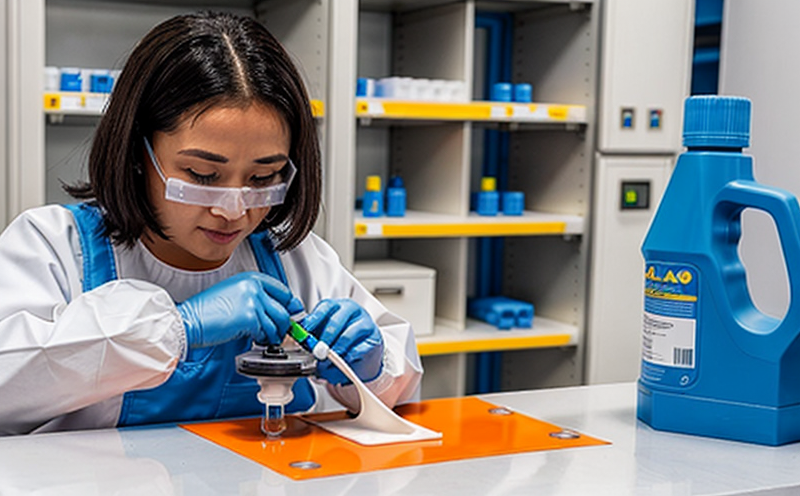Nano Additives in Adhesives & Sealants Testing
The testing of nano additives in adhesives and sealants is a critical component in the development, quality assurance, and compliance verification processes across various industries. Nano additives, such as carbon nanotubes, graphene, or metal nanoparticles, have been increasingly integrated into adhesive formulations to enhance properties like mechanical strength, thermal stability, electrical conductivity, and chemical resistance.
The integration of these materials at the nano-scale level requires precise and reliable testing methodologies to ensure that they achieve their intended performance enhancements. This includes assessing factors such as dispersion homogeneity, reactivity with other components in the adhesive or sealant, and long-term stability under various environmental conditions. Failure to properly test for these attributes can lead to suboptimal product performance and potentially hazardous outcomes.
Our laboratory specializes in providing comprehensive testing services tailored specifically towards nano additives within adhesives and sealants. By leveraging advanced analytical techniques such as transmission electron microscopy (TEM), Fourier transform infrared spectroscopy (FTIR), and rheological measurements, we can provide detailed insights into the behavior of these nanomaterials.
One of our key strengths lies in our ability to replicate real-world conditions during testing. This allows us not only to evaluate immediate properties but also predict long-term performance under expected usage scenarios. For instance, when evaluating mechanical strength, we subject samples to dynamic loading tests that simulate typical application pressures and temperatures.
Similarly, for electrical conductivity assessments, our facilities enable continuous monitoring over extended periods, providing data on how well the additive maintains its conductive properties over time. These multi-faceted approaches ensure that our clients receive robust evidence supporting claims about improved performance from incorporating nano additives into their formulations.
- Replication of Real-World Conditions: Our testing protocols account for all relevant variables encountered in actual applications, ensuring accurate assessments.
- Detailed Insights Through Advanced Techniques: Utilizing cutting-edge instrumentation allows us to capture nuanced details about nanomaterial behavior unattainable through simpler methods.
- Predictive Long-Term Performance: By conducting long-term exposure tests, we can forecast the durability and reliability of nano-enhanced products over extended durations.
Why It Matters
The use of nano additives in adhesives and sealants offers significant advantages across multiple sectors including construction, automotive manufacturing, electronics packaging, and aerospace. In the construction industry, improved mechanical strength can enhance structural integrity while reducing weight through more efficient material utilization.
In the automotive sector, enhanced electrical conductivity from nano additives may contribute to safer vehicle designs by facilitating better grounding of electrical systems. Additionally, increased thermal stability could extend component lifetimes under high operating temperatures, leading to greater fuel efficiency and reduced emissions.
For electronics packaging applications, improved chemical resistance provided by certain types of nanomaterials helps protect sensitive circuits from environmental contaminants like humidity or corrosive gases. In the aerospace industry, lighter yet stronger adhesives made possible through nano additives can contribute substantially to overall aircraft weight reduction - a key factor in improving fuel consumption and operational costs.
However, achieving these benefits necessitates rigorous testing to ensure that nano additives do not introduce unforeseen risks or complications. Proper evaluation is essential for ensuring safe implementation without compromising product quality or integrity.
Applied Standards
The testing of nano additives in adhesives and sealants adheres to several internationally recognized standards aimed at ensuring consistency, accuracy, and reliability across different laboratories. Some key standards include:
- ISO 18569:2018 - Nanotechnology Terminology: Definitions for Characterization, Production and Use.
- ASTM D7434-12 - Practice for Determining the Dispersion of Carbon Nanotubes in Adhesives.
- EN 16805:2017 - Preparation and Characterization of Nanomaterials for Use in Adhesives and Sealants.
- IEC 62448-3:2019 - Conductive Adhesives for Electronic Packaging - Part 3: Performance Requirements and Test Methods.
These standards provide a framework that ensures uniformity in testing procedures, enabling comparison of results between different laboratories around the world. Compliance with these standards also helps manufacturers meet regulatory requirements set by governmental bodies.
Competitive Advantage and Market Impact
Incorporating nano additives into adhesives and sealants offers several competitive advantages that can significantly impact market positioning. By enhancing product performance, manufacturers can differentiate themselves from competitors offering traditional materials alone.
- Increased Performance: Enhanced mechanical strength, improved thermal stability, better electrical conductivity – all contribute to superior product quality and reliability.
- Premium Brand Image: The integration of cutting-edge technology like nano additives can elevate a brand’s reputation as innovative and forward-thinking.
- Cost Efficiency: While initial costs may be higher due to the costlier nature of nanomaterials, long-term savings come from reduced material waste, improved product longevity, and decreased maintenance requirements.





